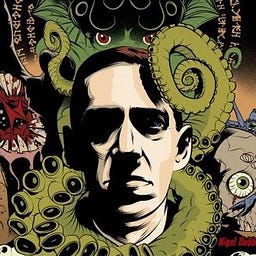Christo-Nietzschean Synthesis: Toward a Functionalist Understanding of Religion, Pt. 3
Description
This is episode 6 - Towards a Functionalist Understanding of Religion pt. 3
Part 1 - Thesis
Which Christianity?
Before we get started, I need to explain the format of this talk, in which I will outline a sketch of what a Christo-Nietzschean synthesis might look like.
Christian theology is a vast body of thought and action spanning two thousand years and over a billion people, though we could argue about the quality of many of those people in the current year.
Nietszche was only one man, but his oeuvre is dense and multilayered and multifaceted, and I think you could spend your whole life studying it and still find something new.
So the most I can do is give you an outline of how and why these two things ought to come together, in the hope that it inspires others to explore the territory which I can at this time only sketch.
I am going to start by explaining a very concrete mechanism in our modern world which serves to sever people from Christianity, and it may not seem immediately clear what this has to do with the promise I am making
In the following segments I am going to talk about some relatively abstract philosophical considerations which might seem a bit disconnected from the first segment, but they inform our pursuit of the goal of synthesis
In the final segment I will explain how these things come together and how we can come to view Nietzsche as a theologian, as the most important theological actor since Martin Luther at least,
(And I can already hear the Catholics rankling at that and they are just going to have to get over it. People who view ideologies as a series of sports teams to cheer at or jeer at are not seeking truth. Go treat Christianity like football somewhere else)
So I am going to ask for your patience.
When we talk about integrating a particular idea into Christianity, we have to start with this question: which Christianity? There are so many Christianities, and often the only thing they have in common is the name of Christ,
If we operate inside of a functionalist frame, then we recognize that the name a group gives to itself doesn’t matter nearly as much as the pattern of their thought processes, their mode of coexistence, the form of their integration with being and the dynamics of their actions.
That is, two groups could call themselves Christian and even affirm the same creed, but be different entirely in their outlook toward life, in the way they socially litigate their day to day actions, in their theory of what is moral and so on.
One of the reasons Christianity is able to spread so widely is that it’s able to accommodate wildly different peoples with incommensurate ways of living and thinking under the same banner, precisely by eliding all of these functional differences and defining itself under this narrow criteria.
Christians want to believe—and in fact they have to believe—that if you sincerely pray to Jesus then you slowly come into convergence with the divine will, and all ostensibly superficial differences are gradually eroded as Christ transforms each believer.
This is the most magical thing that Christians believe, much more magical than the doctrine of the incarnation, the resurrection, the second coming, or the forgiveness of sins.
I think there is simply no reason, if we look at the history of Christianity and theology, to suspect that this happens, because if we look at the history of Christian thought, it doesn’t seem to have converged on anything, or to be converging on anything,
quite the opposite, it looks like any other phylogenetic tree, beginning with a singularity and gradually branching and branching and diverging and diverging into ever more fractal variations.
Roman Catholics very much want to pin all the rot in their religion on the Protestant reformation, because they rightly intuit that each schism apportions a bit more of their claim to be the real true legitimate heirs to the Word of Christ, this is their own prelapsarian delusion.
So regarding the question of “which Christianity?” I am going to try to speak today of a mostly abstract, denomination-less, “mere” Christianity, after CS Lewis.
There is no one true Christianity, even if Christianity is the revealed religion of the one true God of all the universe, because from a strictly information-theoretic perspective, there is no possibility that the limitless, the eternal, the omniscient and omnipotent can possibly be compressed into a mind which is limited, temporal, and possessing finite powers and perspectives.
Why Christianity?
So I think a lot of Christians will also probably bristle at the above, because they tend to think that their own personal understanding of Christianity, although it is a work in progress, is something very close to the absolute truth.
It’s the best and most accurate Christianity they can make it given their limitations and they have constructed it by attempting, through prayer, study, and worship, to align their underlying with an idealized, perfect, hypothetical practice and understanding of Christianity
And when I say there is no one true Christianity, that’s sort of tantamount to saying, the hypothetical ideal you are striving towards doesn’t exist.
And if I were sneakier I would use a rhetorical technique called an enthymeme to try to lead you into having this realization on your own, which would make you think it was your idea, which would make you believe it
But instead I am using a rhetorical technique where I try to put all the cards on the table and roll up my sleeves so that when I show you your card, you’ll know that what I actually did was I palmed it to the bottom of the deck with a fancy shuffling technique.
In other words, I’m not hiding anything, I’m just using my dexterity to re-arrange symbols in an intriguing way
Anyway I am not saying the idealized Christianity


 </picture>
</picture>


